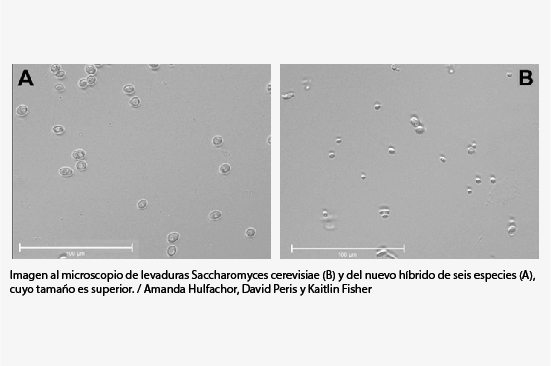
-
Researchers have generated yeast hybrids of up to six species of the genus 'Saccharomyces' to meet industry and consumer demands
-
The technology prevents the loss of half of the genetic diversity of the strains, as is the case with other techniques
A study with the participation of the Institute of Agrochemistry and Food Technology of the CSIC has developed a technology that allows the generation of yeast hybrids of up to six species of the genus Saccharomyces. The finding, which is published in the journal Nature Communications, may be useful not only in the production of alcoholic beverages but also in the production of bioenergy based on yeast.
Beer and wine production companies are facing challenges such as increasing demand for low-grade products or the modification of raw materials as a result of climate change. For their part, biotechnology companies engaged in the production of bioenergy or compounds requiring yeast fermentation are looking for new yeast strains that will shorten the time frame of fermentation processes and do so more efficiently. "Responding to these demands with a single yeast strain is difficult. Instead, the hybridization of multiple strains in the laboratory makes it possible to produce yeasts à la carte and to solve certain problems during fermentation or to produce aromas desired by the consumer," notes scientist David Peris, who during his research worked at the Institute of Agrochemistry and Food Technology of the CSIC and is currently working at the University of Oslo (Norway).
"To date, the ability to generate new yeast strains that have characteristics of other parents was limited to generating hybrids of two species. Normally, these hybrids combined half of the genome of one parent and the other (crosses between haploid strains, with a single set of chromosomes) and lost half of the genetic diversity, since the strains are usually diploid (two copies of each chromosome). However, we have developed a technique that allows the introduction of the diploid genome of several species. In this way we have managed to obtain hybrids of up to six species and we have also observed that their growth capacity can be improved", explains the researcher.
The work, which involves the participation of the University of Wisconsin-Madison, the Great Lakes Bioenergy Research Center (GLBRC) and Truman State University (all from the United States), proposes continuing this line of research to open up new avenues of study in the union of strains for specific biotechnological processes and their potential application at an industrial level.
References:
David Peris, William G. Alexander, Kaitlin J. Fisher, Ryan V. Moriarty, Mira G. Basuino, Emily J. Ubbelohde, Russell L. Wrobel, Chris Todd Hittinger Synthetic hybrids of six yeast species. Nature Communications.
DOI: 10.1038/s41467-020-15559-4

